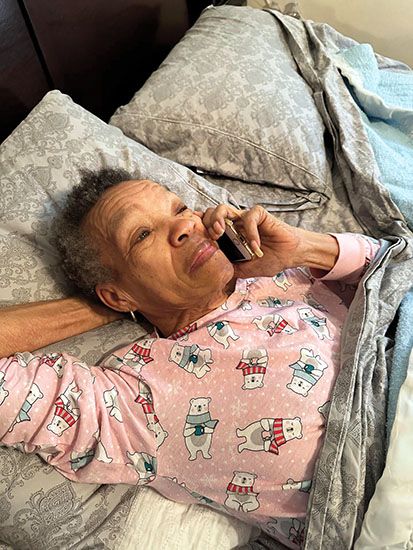Several years ago, before dementia kicked in (or before we realized it was kicking in), daddy damaged his phone. He’d kept it in his pocket during his workouts. Although it was a rugged flip phone, it did not survive the sweat damage that occurred over time. We tried but could not revive the phone, nor could we find a comparable replacement. I tried to convince daddy to let me replace the phone with a smartphone like momma’s, but he refused until we ran out of options.
You see, he was seeking (actually demanding) familiarity and rejecting change. While I think I understood his resistance, I reminded him that things were bound to change. He understood and agreed but challenged me to find an acceptable replacement. After trying a couple different models, he finally accepted the smartphone and loved it. He spent the first few weeks video chatting with us just because he could.
Today, I am anxious about upgrading momma’s phone. I struggle not because she insists on the same model, but because I understand the importance of familiarity in their current mental state. Although I have heard the experts express the importance of familiarity whenever possible, I understand it is so much more. I see how they respond and react when things are unfamiliar. They move much more slowly, if at all, and become extremely confused. They often shut down mentally. I also am keenly aware that keeping that table where it always has been could cause a trip hazard, which can lead to a more immediate physical and mental decline.
While it doesn’t seem super important to track down an older-model smart phone just to guarantee they know how to use it, I deem it important that they are not stressed and frustrated by change unnecessarily. I can do things like place a new phone in a similar case to make it feel and operate like the old one as much as possible.
My parents still live independently in the home they have lived in for more than 50 years. With few exceptions, things are in the same places they were before their dementia diagnosis. As a result, they can navigate around the house with ease, albeit slower. They can do so even in the dark. That familiarity of being in their own home and able to easily assess things gives them with a sense of comfort, independence and pride.
While it doesn’t seem super important to track down an older-model smart phone just to guarantee they know how to use it, I deem it important that they are not stressed and frustrated by change unnecessarily.
That familiarity is sometimes costly to me and those who assist me. It is an emotional expense. It is tempting to move things around and make things easier for the caregiver. However, doing so often causes angst and creates more opportunity for them to retreat. My goal as my parents’ caregiver is to extend their quality of life by keeping them as comfortable and carefree as possible. With that goal always in mind, I sometimes must make changes that decrease their familiarity but increase their safety.
For the past few years, I have been methodically decreasing clutter to ensure they can more safely navigate and roam the house because they are prone to falling. We also are mentally preparing ourselves to forego the familiarity focus when it becomes problematic for them to live independently.
The benefits of familiarity make us think carefully about how we do everything with and for them. When familiarity is not an option, we allow safety precautions to guide us. So, we let them live independently and watch them as closely as possible through security cameras, regular visits, and caregiving aides they know well.



